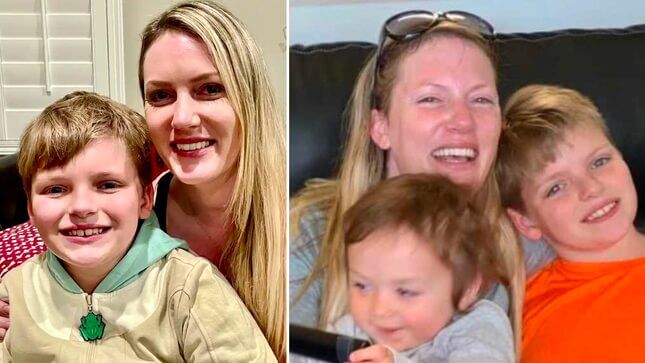Mother Charged With Murder After Home Birth in California Is ‘Harbinger’ of Post-Roe Reality
Kelsey Carpenter lost her newborn after going into early labor in what a medical examiner characterized as a terrible accident. She faces 20 years in prison.
JusticePolitics

In November 2020, Kelsey Carpenter went into labor early and had a home birth that ended in the death of her newborn, Kiera. She chose to give birth at home because she feared her baby would be taken away due to her substance use; Carpenter had already lost custody of her first two children when they tested positive for drugs in the hospital. Following this tragedy, instead of being offered support services to grieve the loss of her baby, Carpenter was charged in 2021 with homicide and felony child abuse, punishable with up to two decades in prison. She’s been in jail since February, when she missed a hearing because she’d checked herself into rehab.
Prior to Kiera’s birth, Carpenter prepared extensively to have a home birth, consulting with a midwife and naming her unborn daughter. According to her lawyers, after giving birth, she cut the umbilical cord and secured it using cloth and tape, then tried to breastfeed her newborn, but passed out due to significant blood loss. When Carpenter awoke, she found Kiera unresponsive and called 911 after unsuccessfully performing CPR on the newborn. Carpenter was taken to the police station and questioned shortly after, while still in shock and acute physical pain.
In an interview with Jezebel, Amber Fayerberg, a consulting attorney for Pregnancy Justice who is working on Carpenter’s case, characterized it as a “harbinger and a symptom” of escalating attacks on pregnant and birthing people’s rights in our post-Roe v. Wade reality.
On Wednesday, oral arguments for the case began in San Diego, California, as Carpenter’s lawyers seek to have the charges against her dismissed. Prosecutors have previously cited Carpenter’s decision to have an “unattended delivery” and her substance use. Her arrest warrant from March 2021 charges her with intrauterine drug use and having a baby at home alone. But in January of this year, AB 2223, a California law that prohibits people from being charged for behaviors during pregnancy that could result in abortion or perinatal loss, took effect. Since then, the district attorney’s office has pivoted to focusing on Carpenter’s behaviors after giving birth. Wednesday’s arguments largely centered around whether or not AB 2223 is applicable to Carpenter’s case.
“This is not a reproductive rights case. This is a case about massive parental failure,” San Diego County deputy district attorney Jennifer Rebecca Kaplan argued. “And it’s precisely the type of case that AB 2223 said it would not cover.”
Kaplan insisted that the law’s protections don’t apply to Carpenter because Kiera died as a result of Carpenter’s actions after pregnancy—namely her approach to cutting the umbilical cord and a slight delay in calling 911 when Kiera didn’t respond to CPR.
But Fayerberg argued that AB 2223 does protect Carpenter, whose case wouldn’t have drawn attention from law enforcement were it not for Carpenter’s behaviors during pregnancy and her home birth. Fayerberg asserted that the act of cutting the umbilical cord is also protected, because “cutting the umbilical cord is an act that is necessarily related to pregnancy,” and AB 2223 protects “any acts or omissions with respect to pregnancy, including perinatal death.” Fayerberg insisted the California law protects Carpenter’s decision to have a home birth, as well.
A county coroner in 2020 deemed the newborn’s death an “accident” and the cause of death as “perinatal death associated with methamphetamine and buprenorphine exposure and unattended delivery.” But a Yale University expert who reviewed placental records for Carpenter’s legal team determined that blood loss from a rupture unrelated to substance use (causing hemorrhages at the umbilical stump and germinal matrix, a part of the developing brain) was the cause of death for the newborn.
Last year, a medical examiner testified at a hearing that there’s no certainty Kiera would have survived a hospital birth, and the same examiner said that Kiera’s death is “not a homicide because there’s no intent to kill.”
-

-

-

-

-

-

-

-

-

-

-

-

-

-

-

-

-

-

-

-

-

-

-

-

-

-

-

-

-

-

-

-

-

-

-

-

-

-

-

-








































